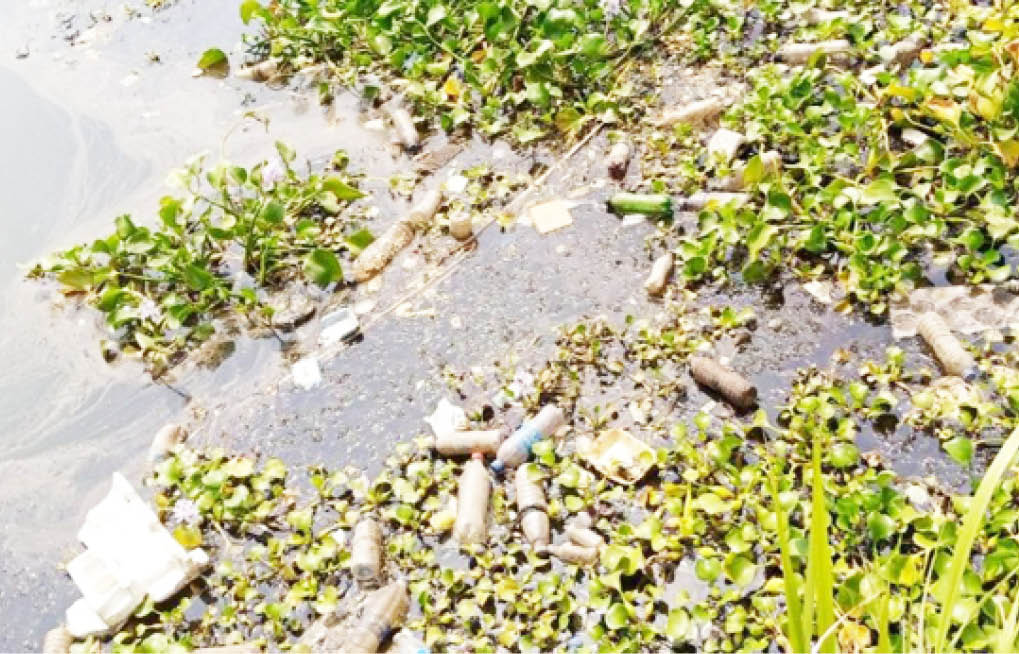Exposing plastic bottles, sachet water to sun increases risk of cancer
A specialist in health management, Professor Tanimola Akande, has said exposing plastic bottles and sachet water to the sun may lead to chemical leaching and release of harmful chemicals like dioxin which increases the risk of cancer. He spoke at the inauguration of members of the Board of Trustees of a non-governmental organization, Palliative Care […]

Water hyacinth and plastic bottles in Jabi Lake
Photo: Dalhatu Liman
A specialist in health management, Professor Tanimola Akande, has said exposing plastic bottles and sachet water to the sun may lead to chemical leaching and release of harmful chemicals like dioxin which increases the risk of cancer.
He spoke at the inauguration of members of the Board of Trustees of a non-governmental organization, Palliative Care Patients Support Foundation in Ilorin, according to a statement made available to our correspondent.
Professor Akande, who is a consultant and Public Health Physician with the University of Ilorin Teaching Hospital (UITH), also cautioned smokers against terminal diseases even as he warned that they are also prone to non-communicable diseases.
He said chronic diseases were prevalent in society due to people’s lifestyles, especially smoking and drinking of alcohol.
- COVID-19 vaccination: Nigeria close to achieving herd immunity – FG
- 3SC receive N100m NPFL-Dozy Mmobuosi Super Cup cash prize
Akande explained that the Pain & Palliative Care Unit of the UITH came about through the co-operation of some public-spirited individuals, groups and organisations, to establish the NGO to harness resources and raise funds for the treatment of patients with life-threatening ailments in the hospital.
In his address, a palliative care physician, Dr Israel Kolawole, who is the president of the NGO, said the establishment of the unit was to cater for those who could not afford the hospital expenses and the rich ones that had been rendered poor because of the financial burden of the care.
He said, “Majority of our patients are indigent; the rich ones have been rendered poor because of the financial burden of care, loss of jobs due to frequent hospitalizations and other challenges of care and stigmatization from their diseases.”
The anaesthetist turned palliative care physician, said the Pain and Palliative Care Unit of the UITH was established over 14 years ago to provide care to meet the peculiar needs of patients with Cancer, COVID-19 and other advanced progressive life-threatening diseases.
He added that “many of the people are living and dying in unrelieved pain with uncontrolled physical symptoms; unresolved psychosocial and spiritual problems, abandoned, in fear, isolation and loneliness.”
“For most of them (patients), it is not the fear of death that is most important. After all, we all are going to die someday. But most people want to die with dignity and in peace. The needs of these patients include relief from pain and other distressing symptoms that constitute suffering in order to improve their comfort and quality of life,” he said.
The wife of the Kwara State governor, Mrs Olufolake AbdulRasaq, who spoke through the state Commissioner of Health, Dr Raji Rasaki, called on influential individuals and wealthy people in the society to support the NGO.
The Chief Medical Director of the hospital, Prof. Abdullah Dasliva Yussuf, lauded the initiative of the Palliative and Care Unit of the university in ameliorating the sufferings of patients, pledging the support of the hospital to the activities of the NGO.
